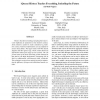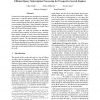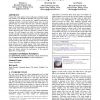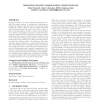AI
2008
Springer
14 years 9 months ago
2008
Springer
Abstract. Conventional web search engines retrieve too many documents for the majority of the submitted queries; therefore, they possess a good recall, since there are far more pag...
LAWEB
2008
IEEE
14 years 9 months ago
2008
IEEE
“History Teaches Everything, Including the Future”, wrote Alphonse de Lamartine in the nineteen century. Even if history cannot be really considered a predictive science, hist...
CIKM
2009
Springer
14 years 9 months ago
2009
Springer
Although Web search engines have become information gateways to the Internet, for queries containing technical terms, search results often contain pages that are difficult to be ...
WSDM
2010
ACM
15 years 16 days ago
2010
ACM
Although Web search engines are targeted towards helping people find new information, people regularly use them to re-find Web pages they have seen before. Researchers have noted ...
WWW
2004
ACM
15 years 3 months ago
2004
ACM
We seek to gain improved insight into how Web search engines should cope with the evolving Web, in an attempt to provide users with the most up-to-date results possible. For this ...
WWW
2004
ACM
15 years 3 months ago
2004
ACM
Recent studies show that a majority of Web page accesses are referred by search engines. In this paper we study the widespread use of Web search engines and its impact on the ecol...
WWW
2005
ACM
15 years 3 months ago
2005
ACM
Many modern natural language-processing applications utilize search engines to locate large numbers of Web documents or to compute statistics over the Web corpus. Yet Web search e...
WWW
2006
ACM
15 years 3 months ago
2006
ACM
Current web search engines are retrospective in that they limit users to searches against already existing pages. Prospective search engines, on the other hand, allow users to upl...
WWW
2008
ACM
15 years 3 months ago
2008
ACM
Current web search engines return result pages containing mostly text summary even though the matched web pages may contain informative pictures. A text excerpt (i.e. snippet) is ...
WWW
2008
ACM
15 years 3 months ago
2008
ACM
Sponsored search is one of the enabling technologies for today's Web search engines. It corresponds to matching and showing ads related to the user query on the search engine...





